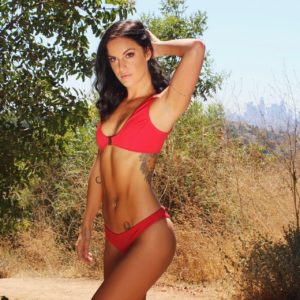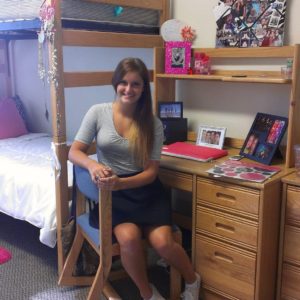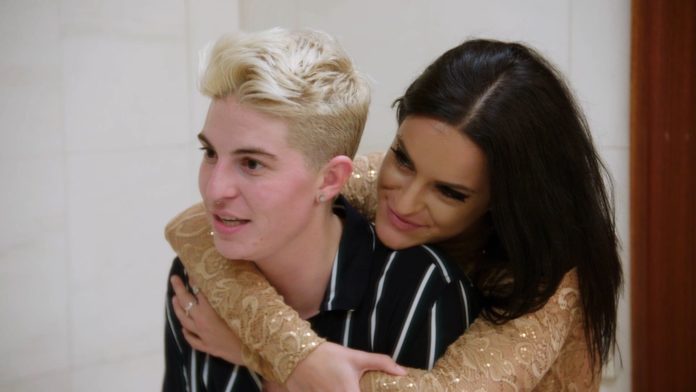This season, the show came with an additional twist: for the first time in TV dating history, the entire cast was sexually fluid, meaning gender was no longer a determinant in who a perfect match may be. Season eight also featured Occidental alumna Jenna Brown ’16 taking part in the monumental step in dating show representation. The queer community rejoiced — including myself and my cohort of friends and Occidental alums, who dedicated one night every week this summer to piling onto a couch and dutifully watching the contestants cry, kiss, drink and pull out a win in the end.
Jenna was a prominent contestant on AYTO, battling her jealousy and obsession with Kai Wes, working through old habits for personal growth and ending the show with her perfect match, Paige Cole. The week the finale aired and the contestants pulled out a win, I met up with Jenna on campus to discuss her experience on the show, revisit her memories as an Occidental student and talk about queer representation in media.

SR: Tell me about what your life at Occidental was like.
JB: As a closeted Indiana Midwestern girl [at Occidental], I took “Power and Sexuality,” “Race and Ethnicity,” “Deviance” and a religious studies class on Christianity all in one semester. My entire fantasy of what I thought reality really was, was just smacked down, crashed. After that, I just became kind of a cynical person. I had all these dreams and hopes and thought everything was one way and it just wasn’t. My entire thing throughout college was how do I figure out if Indiana Jenna or California Jenna is Jenna? Who is Jenna? Still don’t know. College here was amazing, I learned so much. I learned everything honestly. Freshman year was a lot of drunken experiences with men, because at the time I thought I wanted it, but it was definitely a sad-deranged-seeking-validation thing. Sexuality wise, the first girl was the captain of [a sports] team. We met at the Zeta house and she just looks at me, and I’ve never come out before, like ever. She takes me upstairs and she pulled me out of the closet by pulling me into a closet. It was hot. We dated for like two years after that.
SR: You mentioned that both of your two sisters also identify as gay. Were you the first to come out?
JB: I actually was the last. It was funny because my first sister came out and she’s always been a tomboy, so my mom was really mad but believed her. My second sister came out the day after I had sex with [a woman] for the first time. She called me crying because my mom sent her this long list of emails saying textbook pretty much everything you’re not supposed to say.
SR: What was the process of discovering your sexuality like for you then?
JB: [My family] didn’t know I was queer, I knew by the time I was 6. I’ve always known. I’ve loved women my whole life, forever. Six months after I started dating [my college girlfriend], my sisters didn’t know still and I was on the phone with my mom. I had just gotten my eyebrows pierced and she was so mad and I got so heated I just told her, “You know what, Mom, I’m gay!” and I hung up on her and we didn’t really talk for two or three years. Sometimes people just grow up in a society where they’re literally bred to think that it’s disgusting. College was f——- amazing after that.
SR: So after college, you found your way back to LA. Do you like it here?
JB: [At Occidental] everyone here is a big fish in a small pond. It’s a tiny pond. And then when you get out in LA, there’s millions of people. It’s overwhelming, you feel very small when you graduate. But I love it here. I’m very extroverted.
SR: Tell me how you got on the show. What prompted that?
JB: It’s been a weird year, man. I got clean from drugs last July. I was a bit of a drug addict after my last relationship. Turns out I have a really really addictive personality. I went to Seattle for rehab and recovered in Portland [Oregon]. Then, my friend Claire [told me] “They’re doing a queer reality show” and I said, “Dude, I’m totally applying.”
SR: What was the application process like?
JB: It was the longest process ever… We did 500 short-answer questionnaires and then two to three hours of answering long-winded questions. It was so ridiculous. I did a Skype interview and finally got a call I was in the finals in December, and I applied last September, a year ago. In January, they said “We’re flying you out to LA to do an interview.” And when I got there I realized that this is so important. I had just bought a car with all of my savings, turns out it had a blown head gasket and I had to give it to the junkyard. I dropped all my savings on it, I had no money, I was like, “I need to win a reality show. This is my thing, if I don’t win this interview right now I’m screwed.” I got there, listened to Ariana Grande on repeat in the mirror naked, and killed it. A couple weeks later I got the call. It was the most wild experience.
SR: What’s the party culture like on the show? Is it constant?
JB: We don’t really get much downtime. It’s exhausting, we got like three hours of sleep a night, I look like I’m dead for most of the show, it’s so exhausting and the only time we had off was when the camera was off. I feel like the whole thing was such an interesting social experiment. There are 16 of us, we’re all auditioning for MTV, so we all at least a little bit love being the center of attention. Sixteen people like that in one room, you can’t get a word in.
SR: What has it been like since ending the filming of the show?JB: When I got off I was like, I’m never drinking again, ever. It’s super interesting because I’ve been dating around pretty casually but it’s hard because I don’t know who to tell [about the show]. If I meet someone out, maybe they are watching the show and they’re asking me out to just tell me they’re huge fans of the show. I’ve never dealt with Z-list fame before, and that’s what this is: a few months in Z-list fame. But people are caring about my sex life and it’s hysterical! I do have to be careful about who I’m dating because they will take my money from me, which I can finally say I made!
SR: Speaking of the finale, what was it like in the house before the final matchup ceremony?
JB: Kai and I cried the whole day before the last matchup ceremony because we were so scared we were going to lose and we couldn’t afford that. I had to quit my job to go on the show, and I was moving back to LA after and I had like negative 50 bucks. I didn’t have 10 matchup ceremony outfits, so I had to buy those. I was getting so close. I could taste the money.
SR: How did you feel about the strategy of playing with your head over your heart?
JB: I’m a math person. I’m a very logical person. I find it so funny that there was even a fight against strategy because this is a math game, like duh. We have to do that. If we’re not considering the math we’re playing blindly.
SR: What was the most surprising thing about this experience? Was there anything you didn’t expect from the final cuts?
JB: There was so much left out it’s not even funny. There were screaming fights left out. The most surprising thing is that I actually learned something and I’m taking it and using it with my life. I didn’t think going on a reality show would be a test of my life since rehab. I mean, my biggest addiction has always been people. Kai and I have the same love languages — words of affirmation, physical touch, he talks me up like crazy and I get addicted to the attention he gives me. We had this unhealthy relationship from the start. I knew I could see it and knew I needed to stop. This was the same thing that has happened in my past, so I had to be smart about it, which is why I broke up with him so early. And then you see me struggle with going back to him like I have always done in my past. The most powerful thing was the moment I woke up and didn’t care that him and Jasmine [had sex]. I remember crying in the confessional that morning. It was this big revelation for me personally. Coming back from the show, I cut him off and was like, “We’re not doing this for a while, I need to figure out how to be your friend.” Being able to do that is a huge step for me, so having done it on national television keeps me accountable in a certain way so I can be my best self. You never think, going on a reality TV show, you’re going to come out a better person. It was really uplifting, it was cool. Our production company was amazing, they were super gay. Almost all our producers were gay, it was nice. We felt very represented authentically.
SR: What’s it like going in the truth booth?
JB: The first time I went to the truth booth with Kai, I had a big anxiety attack before I went in. You go on the date and you go straight to the truth booth and you’re exhausted and you’re drinking and eating Pop-Tarts. Before you go in the truth booth you have to wait for the cameras, and before we went in I had a real anxiety attack and almost threw up. The truth booth is wild.
SR: How do you feel you were represented on the show?
JB: I’m proud of the way that I was, I think it was genuinely me. You always think when you go on a reality show this is going to be so weird, there’s 50-pound cameras in your face at all times and you’re constantly not just thinking about how you’re coming off to the [people on the show], you’re thinking about how you’re coming off to the world. For the first three days, I was like, “Get this camera out of my face, I can’t cry, I don’t know what to do.” But after that, it was really easy to forget they were there. So watching me on television was weirdly exactly who I am. I think they represented us well, because the production company became really close with us and we had really good relationships with them. They wanted it to be dramatic but didn’t want to demonize us in any way because at the end of the day, this is for the queers.
SR: How did it feel taking part in the first queer season ever?
JB: I do feel like all of us, being queer people, go into the house with a completely different outlook on life. We’ve all been through so much, just the process of coming out and telling friends and family. Having suppressed a part of yourself your entire life, you immediately gain this kind of empathy and you have to be more self-aware than the average person. So, having done something that big and coming into a house where we all know we can be ourselves. My 15-year-old self would bawl her eyes out if she knew instead of hiding that she watches “A Shot at Love” with Tila Tequila from her mother, she actually is kind of on [“A Shot at Love”] — but in a more authentic way! It was beautiful. Every night toward the end, before we went to bed, we just kissed every single person. It was just so cute to me, it was like, “Hey, you don’t have to be embarrassed about this in this place!” When it turned out to be a really genuine representation of who we all were, it was like, “This is the kind of reality TV I want to watch! This is the kind of reality TV we all want to watch.” People really baring their souls, and not just saying, “Well, I think I like him because he’s a doctor.” It was very raw. All of us don’t know another way to be. I mean, if I don’t talk about my problems, I don’t know what to talk about.
SR: Were your family and friends receptive to you going on the show?
JB: My mom wasn’t going to watch it, and I told her don’t watch it. She doesn’t need to see it. My dad watched the episodes I let him watch. My family was really excited, my sisters were really excited about it. I found out my mom’s side of the family were watching it, and they’re from Bloomfield, Indiana, and apparently they say they don’t care for the sexual stuff. But hey, if they’re watching it, they’re watching it. It could teach them something. It’s definitely stressful, but all in all — because it’s not just a trashy television show, it’s something that’s historic — I think everyone’s more proud of us.
SR: What do you think about the concept of perfect matches?
JB: I mean, the thing is that you can’t predict chemistry. I mean, they tell you these people will make you better for these reasons, and I mean I do think Paige could make me a better person — she’s very positive, and I’m not — because of learning about the world. It made me kind of a realist, which I love about myself, but at times I need someone to be like, “Jenna, have some faith.” We joke about how it could be, “Are You the Best Friend?” I think they did a good job with it, but I think everyone in the world can teach you something.
SR: Do you know what you’re going to do with the money?
JB: I’m going to travel. I haven’t had money to travel since abroad. I wanna go on a lot of trips, I want to visit Indiana again and reconnect with that part of myself and I want to buy a car that doesn’t break. I’ve always had no money, that’s always just been my life. It’s going to be hard because I am an addict, so being sad — I know for a fact — is going to make me want to spend my money. I’m honestly scared to get that check, it’s a lot of responsibility. I know myself very well, which wouldn’t have been a thing a year ago. I feel like I do know my character defects like nobody knows, so considering that when I get the money is the most important thing. But I earned this by telling the whole world how crazy I am inside.

Jenna and her 15 fellow contestants pulled through for a win at the end of the groundbreaking season. The same summer AYTO season eight made history, the infamously heteronormative Bachelor franchise introduced the first lesbian couple on its summer series: Bachelor in Paradise. Jenna said she thought of these representations as steps forward, but also that advocacy and acceptance from public media and society at large is still in critical need of work.
![]()































